► Best small SUVs on sale today
► We name the best crossovers, too
► All sizes and budgets covered
If you’re in the market for a new family car, crossovers and small SUVs likely top your list. These vehicles, once seen as a passing trend when they emerged in the early 1990s but now make up the lion’s share of vehicles on the road and are some of the best cars you can buy. For good reason.
Models like the Suzuki Vitara and Toyota RAV4, are now a distance memory. In 2024 small SUVs have matured, becoming a mainstream alternative to traditional hatchbacks and estates. After all, they feature everything the modern consumer wants a high driving positions, spacious cabin, and perceived safety and robustness – despite rarely venturing off-road.
The best new small SUVs and crossovers 2024 at a glance
► Best-handling small SUV: Ford Puma – Find out more
► Best premium compact SUV: BMW X1 – Find out more
► Best all-electric compact SUV: Smart #1 – Find out more
Given the extensive range of choices available, finding the best small SUV can be challenging. To help navigate this crowded market, we’ve crunched data from CAR magazine’s Good, Bad, and Ugly section, along with expert insights from our recent tests. Here’s everything you need to know about the best small SUVs in the UK in 2024.
Best small SUVs and crossovers in 2024
Ford Puma
Best for those who want a strong ultimate all-rounder
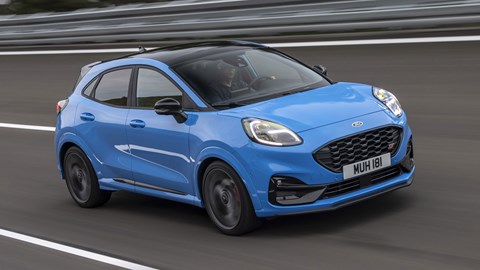
Pros: Enjoyable driving experience; smart styling; lots of neat touches
Cons: Not much in the way of engine options; not as practical as the alternatives
Buying a new compact SUV does not mean abandoning all semblance of driving enjoyment. The new Ford Puma, as a case in point, is a real joy to drive; it has responsive, eager handling, a finely honed chassis, intuitive controls and fizzy powertrains.
Under the bonnet, you’ll find a 999cc three-cylinder turbocharged engine with 48-volt mild hybrid assistance, delivering 153bhp and achieving 0-62mph in 9.0 seconds. And there’s even a hot ST variant, for those who fancy something with a bit more spice.
The Ford doesn’t ditch all the essentials required for a small family SUV in favour of driving dynamism, mind. It packs a large boot, a decent amount of room in the second-row seats, and a good amount of kit. Some competitors are more practical and finished to a higher standard inside, but the Puma stands out for its engaging drive and stylish design.
For a more in-depth look read our Ford Puma review
BMW X1
But for those seeking a fine-driving premium family crossover
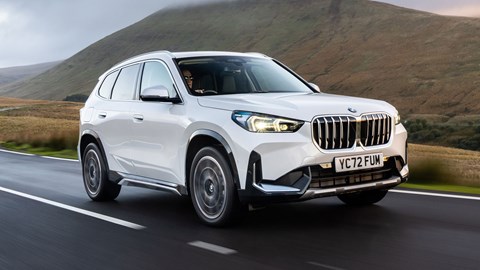
Pros: Upmarket interior; high degree of practicality; refined on-road manners
Cons: Expensive; infotainment system can be annoying
We’re giving the X1 the nod over the Audi Q3 and Mercedes-Benz GLC – and indeed the Jaguar E-Pace – because it’s the best of the bunch to drive out of the best small luxury SUVs. In truth, the X2 crossover is sportier still, but at the expense of some versatility. Unlike the original X1, this is a bona fide family car, with sliding rear seats and a usefully big boot. And while it falls short of the Q3 and GLC for interior ambience, it exudes a similar hewn-from-solid feel.
A wide array of options are available, including petrol, diesel and plug-in hybrid variants, and there are also models with xDrive all-wheel drive, helping provide sure-footed traction in more challenging conditions. And for those wanting stout performance, BMW also offers a 296bhp X1 M35i xDrive version. But even in standard form, the X1 corners keenly and fluidly, rewarding your efforts with a lucid helm and impeccable body control. It’s an SUV you don’t need to make excuses for.
For a more in-depth look read our BMW X1 review
Dacia Duster
Best for those wanting no-thrills practicality
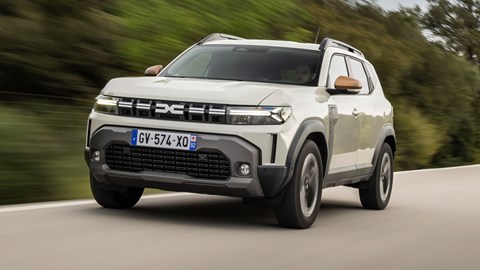
Pros: Great value for money, decent driving experience no-nonsense motoring
Cons: Lack premium feel, not much tech inside
The Dacia Duster formula is well known now: it’s a no-nonsense vehicle designed to offer practicality and affordability – without compromising on essential features. The Duster’s simplicity extends to its performance on the road, where it provides a comfortable and stable ride, though it’s not the most rewarding on the road. Off-road, however is a different story: it’s as robust and capable as its new brutish looks suggest, making it an excellent choice for rural or rugged terrains.
In comparison to its rivals like the Skoda Kamiq and the Renault Captur, the Duster has incredible value for money and rugged build quality. Inside, though, it lacks refinement and advanced tech but compensates its shortfall with a solid and dependable driving experience.
Put simply; it’s an ideal vehicle for those who need a practical, reliable, and budget-friendly SUV without the frills.
For a more in-depth look read our Dacia Duster review
Smart #1
But for those needing a convincing comfort-oriented EV
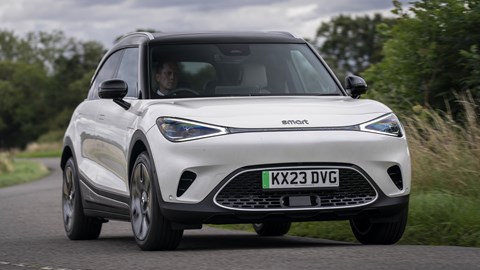
Pros: Lots of kit; enjoyable EV experience; roomy cabin
Cons: Small boot; unintuitive infotainment; overpowered Brabus variant
The Smart #1 SUV is Smart, but not as we knew it. The hashtag one (yes it’s a terrible name isn’t it?) brings a fresh approach to the compact electric SUV market with its 66 kWh battery, delivering a range of approximately 273 miles on a single charge. Power is punch too, as the Smart uses a single electric motor producing 268bhp, with a 0-62mph sprint in just 6.7 seconds. Charging is nearly as quick, with the ability to recharge from 10% to 80% in under 30 minutes using a 150 kW DC fast charger.
On the road, the Smart #1 boasts surprisingly agile handling and a smooth ride, though despite its Apple-esque looks, it’s not as refined as you’d hope inside. That’s only amplified when you compare it to rivals; next to the Mini Electric and the Peugeot e-2008, #1 has a strong range with quick charging capabilities, but it falls short in interior sophistication and cutting-edge tech.
For a more in-depth look read our Smart #1 review
Mini Countryman
Best for those who prioritize style and driving enjoyment
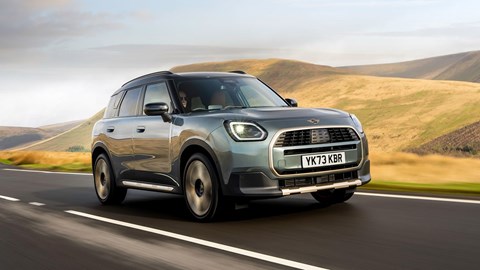
Pros: Distinctive styling, fun driving dynamics
Cons: Disappointing interior space
Want the charm of a Mini with the practicality of an SUV? Then step this way towards the new Mini Countryman. Now with a redesigned exterior, the Countryman is equipped with a range of engines, from the efficient 1.5-litre three-cylinder turbo petrol to the more powerful 2.0-litre four-cylinder option with 215bhp. There’s also a plug-in hybrid variant, and an EV version you can read about here.
On the road, the Countryman looks the part, but under those cheeky looks you’ll be pleased to find agile handling and responsive steering. It’s a driving experience that’s both engaging and comfortable, though some might find the ride a bit firm.
When compared to rivals like the Audi Q2 and BMW X1, the Mini Countryman has more character and is certainly more fun to drive, but it lacks that bit of interior space and luxury inside.
For a more in-depth look read our Mini Countryman review
Volvo EX30
Best for those who want style, safety and performance
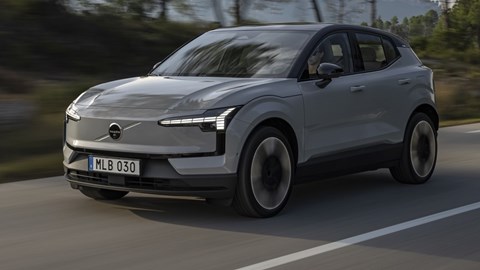
Pros: Impressive performance, high-quality interior, practical
Cons: Dual-motor variant takes a hit on range, very unintuitive tech
Remember Volvo just meant estates? Not so in 2024. The Volvo EX30 is a compact SUV that is equipped with a single motor producing 268bhp, and it that’s not enough power, an optional dual-motor setup offers 422bhp, making it one of the quickest Volvos with a 0-62mph time of just 3.6 seconds.
Range is competitive, with the single motor variant providing up to 280 miles on a full charge, while the dual-motor version slightly less due to its higher power output. Charging is quick, with the capability to recharge from 10% to 80% in about 27 minutes using a 150kW fast charge.
On the road, the EX30 delivers a refined and comfortable driving experience, just as you’d expect from a Volvo. The cabin is similarly safety-conscious and luxurious too; you’ll find high-quality materials and a minimalist layout centred around a large touchscreen infotainment system.
Compared to rivals like the wildly popular Tesla Model Y and the BMW iX1, the EX30 stands out with Scandinavian design, robust safety features, and impressive performance. It’s on this list because it’s got great performance but is still a little different from the norm.
For a more in-depth look read our Volvo EX30 review
Toyota Yaris Cross
Best for those seeking a practical and efficient SUV
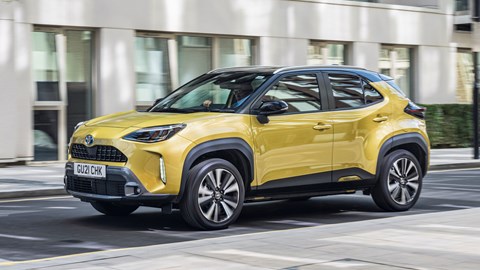
Pros: Ease of ownership; economical; spacious interior
Cons: Uninspiring infotainment; a bit charmless and dull
The Yaris is one of our favourite hatchbacks, and the Cross uses the same formula but makes it bigger. It’s powered by a 1.5-litre three-cylinder petrol engine paired with a self-charging hybrid system, producing a combined 115bhp. Toyota knows all about hybrids, so it’s no surprise that this system achieves an impressive fuel economy of around 65 mpg. Charging isn’t a concern with the Yaris Cross, as its self-charging, mild hybrid system too.
As for driving? On the road the Yaris Cross is perfectly fine, and light but quick steering makes it a breeze to navigate city streets and tight parking spaces. Inside, you’ll find similar robust if not utilitarian design, with a practical, well-designed dashboard and quality materials. Still, don’t expect the premium feel of the Toyota’s more upmarket competitors.
Compared to rivals like the Nissan Juke and Renault Captur, the Yaris Cross’ hybrid powertrain makes it a thriftier buy – and that’s before you factor in Toyota’s renowned reliability.
For a more in-depth look read our Toyota Yaris cross review
Skoda Kamiq
Best for those seeking a compact yet spacious SUV with bags of practicality
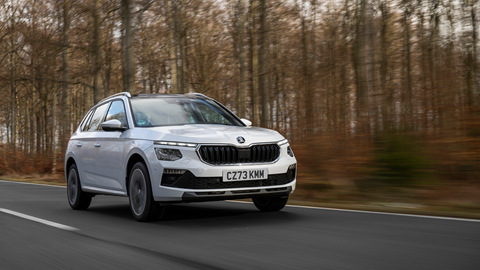
Pros: Practical and spacious interior
Cons: Ignore the lower base petrol engine
The Skoda Kamiq does a compact SUV the ‘Shkoda way’ and that means it practicality with a touch of sophistication. It comes with a wide range of engines for picky consumers; there’s a 1.0-litre three-cylinder petrol engine producing 94bhp, another with 114bhp, and a 1.5-litre four-cylinder petrol engine delivering 148bhp.
The Kamiq is typically presentable inside, with lots of space for passengers and cargo, and a user-friendly infotainment system – not always a given on VW Group products. Handling is good but not spectacular; it navigates potholes admirably in urban environments with agility and offers a comfortable ride on highways, thanks to its well-tuned suspension.
When compared to rivals like the Volkswagen T-Cross and the Nissan Juke, the Kamiq adds a big dose of practicality and value for money – exactly what you’d expect from the Czech brand.
For a more in-depth look read our Skoda Kamiq review
Small SUVs buyers’ guide
First, a reality check: unless your nearest neighbours are a herd of Highland cattle, an SUV, even a small one, isn’t the most rational choice. A conventional hatchback or small estate will usually be cheaper to buy, thriftier on fuel and more fun to drive. But sports cars aren’t rational either – and that doesn’t stop us wanting one. If you have set your sights on a small SUV, here’s what to bear in mind.
Think carefully about whether you need four-wheel drive. Unlike full-sized 4x4s, small SUVs are generally front-driven, but decent ground clearance means most can handle a green lane or muddy car park. Opting for all-wheel drive – if available – adds cost, weight and complexity, and counts for nothing in genuinely treacherous conditions without the right tyres.
Diesel was the default choice for anything at the upper end of this sector, but poor publicity has caused sales to nosedive. Already, some cars here are no longer offered with a diesel engine. New alternatives include plug-in hybrid and fully electric powertrains, although don’t rule out diesel entirely. Its torque-rich delivery and efficiency still makes sense for SUVs, and the upfront cost can pay off for higher-mileage drivers.
What is the best small SUV?
It depends to some extent on what you need from your new SUV but, overall, the Ford Puma is one of the most appealing compact crossovers around. It ticks the major boxes, such as practicality, equipment and styling, but also serves up an enjoyable driving experience. The entertainment it provides is what really gives it an edge over its competitors, and it ably proves that you don’t have to ditch all hope of driving fun if you buy something from this class.
What is the best used small SUV?
Because there have been so many small SUVs offered in recent history, there’s a wide array of choice on the used market. There are options such as the Renault Captur, the Suzuki Vitara, the Skoda Kamiq, and the Citroen C3 Aircross. And, truth be told, you’d not go far wrong with a lot of those options. But, already, there are an array of good used Ford Pumas on offer, with sensible examples available for less than £14,000 now.
Which small SUV has the biggest boot space?
The small SUV sector encompasses a wide range of vehicles, so there’s quite a wide variation in terms of interior practicality and boot space. Out of those here, it’s the BMW X1 that trumps the competition on the practicality front, offering up to 540 litres of storage space. The XC40 and Duster aren’t far behind, though. Don’t forget to measure the length of the load bay and check to see how high its lip is, either, if practicality is essential – sheer size isn’t the only consideration when it comes to how useful a boot is.
Which small SUVs have the best towing capacity?
If you’re looking for an affordable option, then the compact Dacia Duster is probably your best bet for towing duties. Opt for the Blue dCi 115 4×4 model and you’ll get a practical SUV with a maximum braked towing rating of 1,500kg, while its comparatively inexpensive nature means you probably won’t be as precious about its paint and panel work when pressing it into service. Its additional traction will also come in handy on campsites and on rougher roads, too.
What is the most economical small SUV?
Overlooking the zero-local-emissions electric options, there are plenty of fuel-sipping options in the small SUV market. Unsurprisingly, it’s the petrol-electric hybrid Toyota Yaris Cross that’s one of the most economical small SUVs around. But many contenders here, thanks to their lower weight and efficient engines, are capable of averaging in the region of 50-60mpg. However, what you average in the real world will depend on the conditions and your driving style.
Why are small SUVs popular?
Many find their styling and presence desirable, and many also perceive small SUVs to be more practical and safe than their conventional counterparts. And, to be fair, many small SUVs now offer an appealing blend of comfort, practicality, efficiency, equipment and driving dynamics in an affordable package. But, in many a case, a regular hatchback would prove more practical, better to drive, and less expensive to run. That’s not to say they’re completely without point, though; the higher hip point of many compact crossovers improves egress and ingress, and can make things such as fitting child seats much easier, while their higher ride height, vantage point, shape and body cladding can make them less nerve-wracking to drive on potholed roads and in urban areas.
What is the best automatic small SUV?
Pleasingly, there are a lot of good automatic options in this sector of the market. If you want a premium compact SUV with an automatic, go for the BMW X1 or Volvo XC40. If you want something majoring on reliability and frugality, go for the Toyota Yaris Cross, the E-CVT of which helps the car to deliver an effortless driving experience.